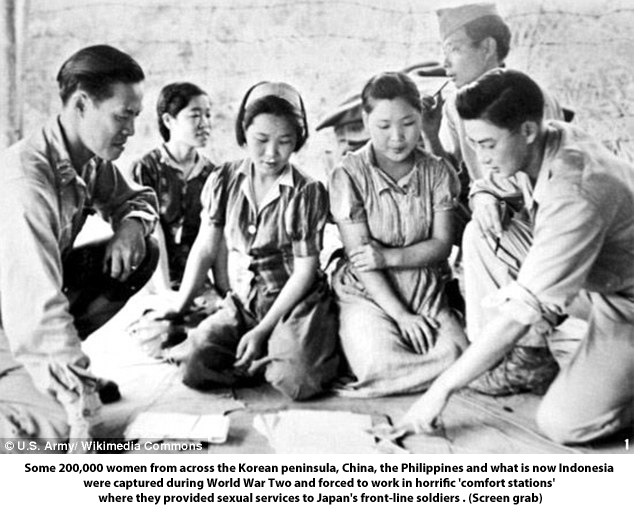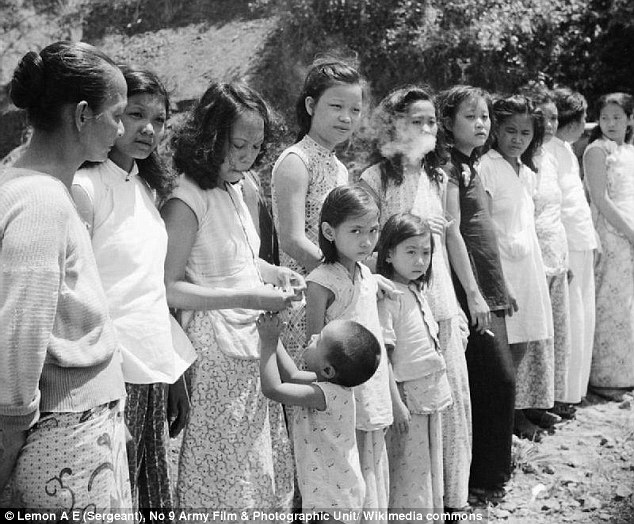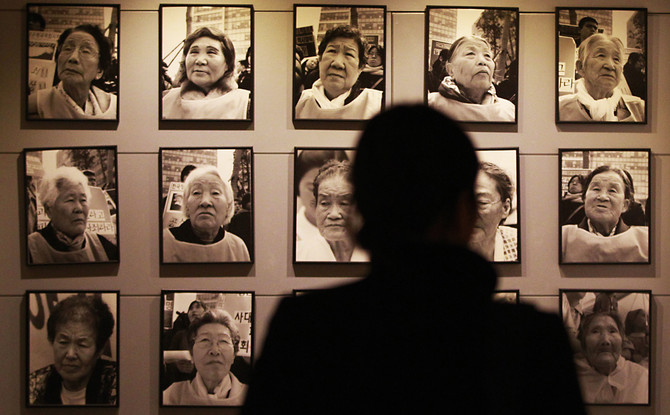SEOUL: The Seoul government has released rare video footage of Korean women forced to work in Japanese military brothels during World War Two, the first time moving images have been shown of the "comfort women".
A government-funded research team from Seoul National University found the footage, which was filmed in 1944 by an American soldier, in the United States National Archives after a two-year hunt.
"South Korea has not had its own data on comfort women and (has) been relying on Japanese and American data," said Kang Sung-hyun, an academic on the team.
"It is crucial for South Korea to have our own data for the issue of comfort women," he said.
The 18-second black-and-white clip shows seven women lined up outside a brick house, being questioned by Chinese soldiers. The women were found by U.S.-China allied forces in China's Yunnan province, the research team said in a statement.
The women were registered by U.S. soldiers, the research team said. Two of the women in the video had already appeared in previously released photos of "comfort women".
The term is used to describe girls and women from South Korea, China, the Philippines and elsewhere, who were forced into prostitution in Japanese wartime military brothels.
South Korean activists estimate that there may have been as many as 200,000 Korean victims.
Japan and South Korea agreed to resolve the issue "finally and irreversibly" in 2015 if all conditions were met. Japan made an apology and promised one billion yen ($8.84 million) for a fund to help victims.
However, the issue continues to strain relations between the two countries.
Japan wants South Korea to remove a statue near the Japanese consulate in Busan city commemorating Korean comfort women, as well as another near the Japanese embassy in Seoul, saying that the presence of the statues violates the 2015 agreement.
South Korean President Moon Jae-in suggested during his campaign for a May 9 election that most South Koreans did not accept the 2015 deal negotiated by his conservative predecessor Park Geun-hye and Japanese PM Shinzo Abe, and that he could try to renegotiate it.
Since the election, he has not directly addressed whether he will seek to renegotiate the pact. The issue is likely to be discussed when he meets Abe on Friday on the sidelines of the Group of 20 summit in Hamburg, Germany. ($1 = 113.1500 yen)
Rare footage shows Korean "comfort women" from World War Two
Rare footage shows Korean "comfort women" from World War Two

Saudi artist transforms scrap metal into sculpture

- Mishal Al-Amri has been upcycling waste materials into artwork for 20 years
- He recently held his first public exhibition under the theme 'The Neglected'
JEDDAH: Where others see scrap metal destined for the trash, Saudi artist Mishal Al-Amri sees opportunities to create artwork.
In his bustling studio in Jeddah, Al-Amri works to remove rust before cutting, rolling, shaping and joining thousands of pieces of shaped scrap metal by hand.
He has been upcycling unwanted bits of metal throughout his artistic career, which has spanned 20 years.
“The artist has an eye that sees what others cannot; an eye that captures the beauty in the heart of the damaged and neglected, and restores it to life and meaning. My ultimate hope and goal are to give scrap metal a new life,” Al-Amri told Arab News.
When growing up, Al-Amri loved to draw. As he got older, he started painting. It was not until he retired at the age of 59 that he discovered his true passion and began sculpting with recycled metal after teaching himself how to weld.
“As I said before, it was just a hobby and I stopped it for a long time after I joined the banking sector due to the difficulty of balancing the hobby, the job, and then the family later on.
“Anyhow, when I was approaching 40 years of age, and after having a family and professional job, I began to pursue my artistic journey once again. I worked on paintings during my free time and vacations, and I lived for nearly 26 years just painting, readings, attending art seminars, workshops, and holding exhibitions alongside other local artists.”
Speaking about how he started collecting scrap metal items from the street, the 65-year-old said: “The spark for this artistic journey was the first moments of an evening walk, when my eyes would trace the floor littered with scraps of plastic, scraps of iron and discarded remnants of lighting and plumbing, no longer fit for use or neglected.”
He added: “These pieces I picked up from the streets would become the core of my personal art collection — materials I plucked from the fate of neglect to submit to my ideas and participate in the creation of beauty.”
These materials can end up waiting for days and sometimes years in storage in his studio until an idea suddenly emerges.
“The journey of constructing the painting or sculpture begins; from choosing the colors and sizes of the pieces, to weaving the relationships between them into an artistic composition that gives it a new spirit.”
The Saudi Arabian Society for Culture and Arts recently hosted his first solo exhibition showcasing under the theme “The Neglected.”
“This exhibition is the fruit of those moments; an invitation to see the beauty in the unusual, and to contemplate art’s ability to redefine what is damaged and neglected to ultimately become more precious and valuable,” he said.
“My artistic experience in this exhibition is based on two complementary principles: First, protecting the environment from the effects of pollution and human-caused damage, by collecting remnants of harmful materials in the soil and saving them from becoming a burden on the earth.
“Second, sustaining the usefulness of objects, by recycling them and using them in the field of art after their original function has ended, reborn as works of art that convey an aesthetic, humanitarian and environmental message.
Al-Amri says that he plans to continue creating scrap metal sculptures and paintings.
“On a personal level, I want to reopen the Cezanne Fine Arts Center, which I founded years ago and continue to cultivate art until its very end.
“On a more general level, I strive to raise environmental awareness, enabling people to respect and preserve the environment.”
Skincare brand promises care for Arab complexions

DUBAI: Biochemist and content creator Toufic Braidi is on a mission to bridge tradition and science with Antati, which he says is a “clean” beauty brand formulated specifically for Arab skin and the region’s climate.
With many of his videos racking up 100 million views and counting, Braidi has parlayed his background in biomedical engineering and biochemistry into a line developed and manufactured in Lebanon.
“I realized there was a huge gap in the Arab world when it comes to good skincare, especially products that respect our climate, our genes and our culture,” Braidi told Arab News.
Antati’s formulations are fragrance-free, vegan, halal-certified and non-comedogenic.
“We are committed to creating risk-free formulations that are clean, safe and effective,” he said, noting that the brand avoids ethanol, pork derivatives, animal-based ingredients and synthetic fragrances.
“There’s a lack of cultural respect in the global beauty industry. I wanted to create a brand that truly reflects us.
“Why am I going to go and spend on skincare that doesn’t care about what Mahmoud from Riyadh thinks — when Mahmoud from Riyadh is a conservative halal consumer who deserves to be seen?”
The brand name Antati is derived from the Arabic words “anta” and “anti,” the masculine and feminine forms of “you,” reflecting the brand’s inclusive mission.
Its product range includes Arabian Pearl Face Cream, Shams Glow Serum, Sahara Shine Serum, and Desert Breeze Toner, all with names inspired by Arab geography and heritage.
Designed to work with common traits of Arab skin, such as higher melanin levels, oiliness and sensitivity to heat, Braidi emphasizes that understanding skin function is key.
“Arab skin is robust, but we live in harsh climates. We need ingredients that hydrate without increasing sebum and that won’t irritate sensitive skin.”
Despite launching only seven months ago, Antati has seen strong organic growth. Endorsements include pop superstar Myriam Fares’ unexpected Snapchat post driving thousands of sales.
“At first, I thought our moisturizer would be the least popular,” Braidi said. “But the Arabian Pearl Face Cream is our bestseller.”
For Braidi, Antati is more than skincare: “It’s confidence, empowerment and self-care created by an Arab, for Arabs.”
Cast member unfurls large Palestinian flag on London’s Royal Opera House stage

- Royal Ballet and Opera says protest ‘completely inappropriate for a curtain call’
- Member of audience describes protest scenes as ‘extraordinary’ and ‘incredible’
LONDON: A cast member unfurled a large Palestinian flag on stage during the curtain call of “Il Trovatore” at the Royal Opera House in London on Saturday, prompting a brief scuffle with an official attempting to stop the protest and remove the flag.
A video shows a performer in a tussle with an official, as they refuse to relinquish the Palestinian flag, and continue to display it, at one point shaking it gently.
Seconds later, other officials, thought to be staff at the Royal Opera House, were shouting messages to the protesting actor from the wings, who looked ahead and appeared to ignore them. At the same time, the audience continued to applaud the performance.
Royal Ballet and Opera said the protest was “completely inappropriate for a curtain call.”
A spokesperson told the BBC: “The display of the flag was spontaneous and unauthorized action by the artist. It was not approved by the Royal Ballet and Opera and is not in line with our commitment to political impartiality.”
During the tussle, two performers beside the protester lurched to the side, while cast members further forward appeared oblivious to the situation.
Palestinian flags are commonly seen at protests supporting Gaza, as Israeli attacks on the Palestinian coastal enclave have continued since late 2023.
The flag of Palestine has also appeared at major events in the UK, including the Glastonbury Festival, where some bands and artists have featured it on stage.
The identity of the cast member remains unclear. “Il Trovatore” concluded its 11-night run at the Royal Opera House, Covent Garden, on Saturday.
One member of the audience posted on X: “Extraordinary scenes at the Royal Opera House tonight.
“During the curtain call for ‘Il Trovatore,’ one of the background artists came on stage waving a Palestine flag.
“Just stood there, no bowing or shouting. Someone offstage kept trying to take it off him. Incredible.”
Saudi stars promote new film ‘Al-Gaid’ by Telfaz11

DUBAI: Saudi actress Maria Bahrawi took to social media to promote studio Telfaz11’s latest film, “Al-Gaid.”
The 18-year-old actress shared a post about the new film on Instagram Stories, featuring several stills from the movie.
The film is directed by Hussam Al-Halwa and written by Ahmed Al-Haqil.
Starring Yaqoub Al-Farhan, Saad Al-Shatti, Khaled Abdel Aziz and Ibtisam Ahmed, the film is set against the backdrop of the 19th-century northern Arabian desert in winter. It was penned by Saudi novelist Ahmed Al-Hokail and blends the revenge genre with Bedouin soap opera tropes, according to Variety. The film “(crafts) a unique narrative tailored for an Arab audience,” according to a Telfaz11 statement. “Rooted in an authentic Saudi perspective, ‘Al-Gaid’ aims to revolutionize the landscape of Saudi epic films,” the statement added.
Telfaz11 is a homegrown creative and media studio that has been behind successful Saudi projects like “Sattar,” which became the highest-grossing Saudi movie in the first three months of its release, and “Mandoob,” which beat “Wonka” from Warner Bros. on its opening weekend in Saudi Arabia in 2023.
Although she does not star in the film, Bahrawi is one of many Saudi stars whipping up excitement over “Al-Gaid,” with the likes of actress Mila Al-Zahrani and creative director Ahmed Al-Kaabi taking to her comments section to discuss the new movie.
No stranger to success herself, Bahrawi starred in “Norah,” the debut feature of Saudi filmmaker Tawfik Al-Zaidi, which screened in the Cannes Film Festival’s Un Certain Regard section in 2024. The film received the Special Mention accolade at the event.
The movie, shot entirely in AlUla, is set in 1990s Saudi Arabia when the professional pursuit of all art, including painting, was frowned upon.
Besides Bahrawi, the movie also stars Yaqoub Al-Farhan and Abdullah Al-Satian. It follows the story of Norah and failed artist Nader as they encourage each other to realize their creative potential in rural Saudi Arabia.
The movie was backed by the Red Sea Fund — one of the Red Sea Film Foundation’s programs — and was filmed with an all-Saudi cast and a 40 percent Saudi crew.
“I’m living the dream. Inshallah, I’ll reach bigger and higher goals. I have all the opportunities in the world, now it’s up to me to take them,” Bahrawi previously told Arab News while discussing the film
Nancy Ajram lands Times Square billboard

DUBAI: Lebanese superstar Nancy Ajram was featured this week on a Spotify billboard in New York City’s Times Square.
She was named the EQUAL Arabia ambassador for July, coinciding with the release of her new album, “Nancy 11.” EQUAL Arabia is a program that aims to amplify the work of women creators by giving them international recognition.
With a career spanning more than two decades, Ajram is known for hits such as “Ah W Noss,” “Ya Tabtab” and “Badna Nwalee El Jaw.” She has released several chart-topping albums, blending traditional Arabic melodies with modern pop, and has built a wide fan base across the region and internationally.














